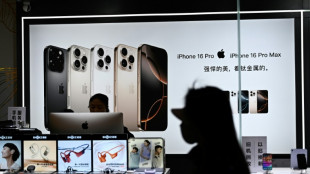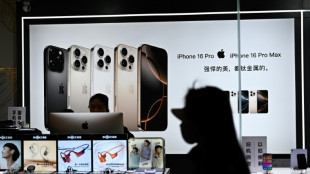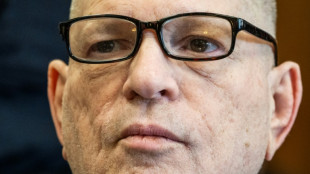
Beijing consumers mull spending habits as 'worrying' tariffs kick in

Chinese consumers in Beijing mulled their their spending habits and said they are prepared to forego American brands if that means avoiding the pinch from the escalating trade war with the United States.
Some worried prices of their favourite products could escalate after US President Donald Trump's tariffs came into force on Wednesday.
Outside a shopping mall in central Beijing, massage therapist Gao Xin, 26, listened to music on his iPhone and considered whether his next device would have to be a different brand.
"I have always used (US products) in the past, including the (phone) I use now, but if there is really a big wave of price increases, I may choose domestic ones."
Tariffs levied by both Beijing and Washington stand to have a complex impact on prices of goods from around the world as supply chains are hit by higher costs of components or equipment.
But prominent US brands such as Apple -- even though it produces phones in China -- are an easy target for anxiety about price hikes caused by the trade war.
Nearby, a man sporting Oakley sunglasses said he would switch to a non-US brand if his favourite products became more expensive.
China imported around $163 billion-worth of goods from the United States in 2024 -- 6.3 percent of the Asian country's imports.
After a tit-for-tat volley between Washington and Beijing, China faces cumulative tariffs of 104 percent -- the highest imposed by Trump's sweeping assault on global trade.
China has responded with its own 84 percent tariff on US goods, due to take effect from Thursday.
"It's very worrying," lawyer Yu Yan, 54, said of the duties, adding that she sees echoes of the Great Depression in recent events.
"The economy may fall into a depression, which is something we all don't want to see," she told AFP.
China's economy is already struggling from a property crisis, low consumption and high government debt.
The new tariffs could hurt the country's goal of achieving around five percent growth this year, Nomura analysts said last week.
- Heating up -
Stock markets around the world tumbled as Trump's measures against dozens of trading partners came into effect.
Some countries dispatched envoys to Washington to negotiate, while China -- Washington's top economic rival but also a major trading partner -- vowed to take "firm and forceful" steps.
In Beijing, massage therapist Gao said he saw the tariffs that Beijing and Washington were lobbing at each other as "a means of intimidation".
"I think there will definitely be an impact, but for most ordinary people, I don't think it will be a big problem, unless you are doing some foreign trade," he said.
Tech professional Sun Fanxi said reading about the tit-for-tat measures made her nervous.
"I'm scared that (tariffs) will lead to a real hot war," the 27-year-old said. "That would be bad for everyone."
But she added that no matter what happens, she fully supports China's moves.
"If the country wants us to do something, then so be it," she said.
P.Roux--PS

 London
London

 Manchester
Manchester
 Glasgow
Glasgow
 Dublin
Dublin
 Belfast
Belfast
 Washington
Washington
 Denver
Denver
 Atlanta
Atlanta
 Dallas
Dallas
 Houston Texas
Houston Texas
 New Orleans
New Orleans
 El Paso
El Paso
 Phoenix
Phoenix
 Los Angeles
Los Angeles



